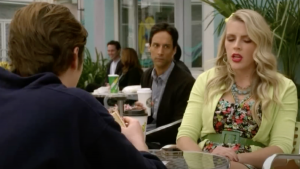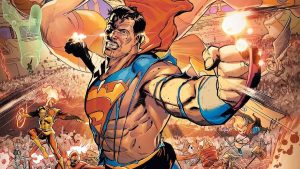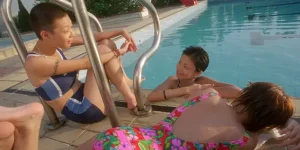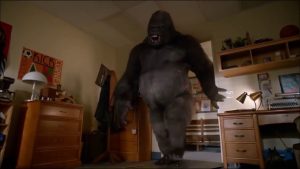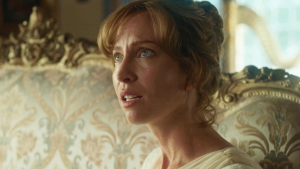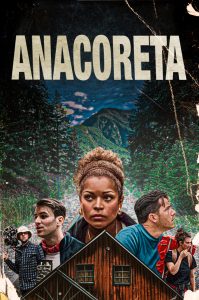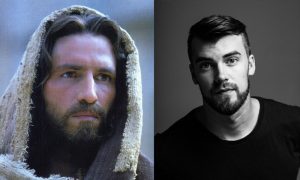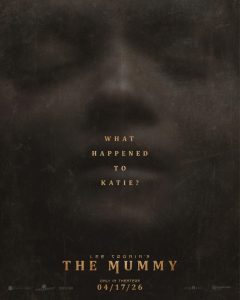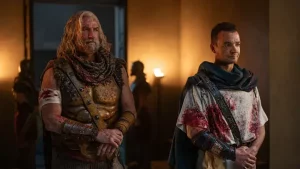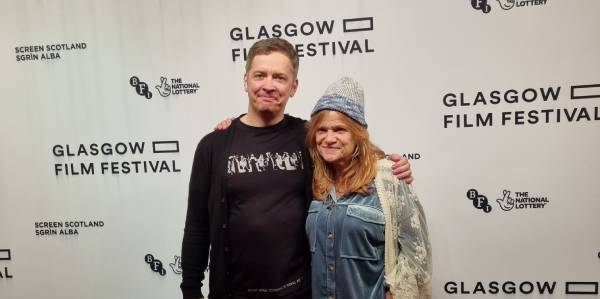
Although there has been a rise in popularity of the “geriatric” subgenre – thanks mainly to Luc Besson and Liam Neeson – few, if any, have starred women. A string of older men have made their name or reinvented their careers as ass-kicking, take-no-prisoners pensioners fighting either against the society that forgot them, or against the corruption of the world around them. Karl R. Hearne‘s The G does both. Featuring an incredible performance from stalwart character actor Dale Dickey, finally getting the credit she deserves, The G is the story of Ann Hunter (Dickey) who, alongside her niece Emma (Romain Denis) takes on an elder care system which has exploited and destroyed many lives.
When I meet with Hearne and Dickey at the Glasgow Film Festival, both are in a cheerful mood. It is early morning and The G is premiering that very day. There’s a sense of excitement from both, but especially Dickey. “I’ve always wanted to come to Scotland” she tells me. Although jetlagged from their flight, both provide humour and insight into their new movie, and why it was important for them to make it.
Tough Irish Grandmothers
Daryl MacDonald for Film Inquiry: So Karl, I heard the idea for this movie came from something to do with your own grandmother, did I read that correctly?
Karl R. Hearne: Yeah you did, absolutely. The entire inspiration is from one real person; my Irish grandmother. She was a tough cookie, and someone I always admired. This was a woman who definitely had a lot of rage and anger, but she was also just a really smart woman, really talented. Someone I think I had a close relationship with, but no one ever really knew with her. So it was essentially this person, and then putting them in this particular scenario, that I also find morbidly fascinating. It’s not just the idea of elder exploitation but also it’s taking over the lives of other human beings against their will.
So yeah, that was the inspiration for the film, then it was just a question of finding someone who could embody that, and that’s what Dale has done so beautifully.
Dickey and Hearne at the premiere of The G at the Glasgow Film Festival
Was Dale always the one you had in mind for this project?
Karl R. Hearne: Yeah, once the process started she was the person I thought would be great. I’d seen Dale in quite a few things, and even though most of her roles have been in a supporting capacity, even in those roles you can see a tremendous range. I remember watching Leave No Trace, and she has a role in that that’s very underplayed, very tender. That’s what fascinated me. I knew she could be heartless and murderous, but it was the other facets that intrigued me. I think that even though they’re buried deep – just like they were in the real life inspiration – they’re present. There’s moments of tenderness, there’s a depth of feeling and character.
Older Women In Film
Dale, the first time I saw you in anything, I think, was My Name Is Earl.
Dale Dickey: Ah, Patty the daytime hooker!
Ha, yeah! To Karl’s point, a lot of your work is as a supporting actor. Is this the first time you’ve been the lead and if so, what was that like?
Dale Dickey: It’s my second. My first was released in 2022, called A Love Song. That director (Max Walker-Silverman) wrote that role for me because me and my co-star (Wes Studi) have both played bad-ass, cut people throughout our careers and he wanted to show a softer, gentler side. And then Karl took me back to the other side!
Karl R. Hearne: You know what’s interesting about that is it’s totally true. This is still a bad-ass role but it’s interesting that both he and I had that same thought process of [showing] the gentler side, but that’s a very different kind of role and it shows not only Dale’s ability to sustain a film feature but I mean; look, she’s been universally praised in this role and hopefully she’ll get more of these now, because they’re in short supply it seems.
So was there an attempt to prove something with this movie? That a woman of a certain age could lead a movie?
Karl R. Hearne: It wasn’t the inspiration or original idea of the film, but once you start on this path you’re thinking “I haven’t seen any other film like this”. I mean, I can definitely think of some revenge thrillers with older men, but funnily enough ‘older’ for men can be anything. Older for women is like 40 years old. Older for men is like 90. You think of Michael Caine in that British film where he plays a pensioner.
Harry Browne.
Karl R. Hearne: Yeah! So there’s things like that. Obviously Clint Eastwood.
Liam Neeson…
Karl R. Hearne: Yeah, Liam Neeson! So I wasn’t trying to make an explicitly political film, but to me it’s implicit just by making the film [because] of course that’s an important idea here. Because it doesn’t exist. So does this show that it can work? Yeah, absolutely. On the other hand, it’s not a Hollywood film, it’s not a studio film. This is a low budget film. But hopefully it’ll open some eyes, you know?
Dale Dickey: Along those lines of age, particularly in Hollywood, what I notice is that there’s so many actresses that did so much work [when they were younger] and now they’re only in their 50s and I don’t see them as much anymore. You don’t see a wrinkly face like mine on screen. I remember reviews for A Love Song came out and they called me “wonderfully weathered” (laughs). But women age, and I’d love to see women embracing that.
Is that what drew you to the character, Dale?
Dale Dickey: Well, I think her fierceness and her resolve too. And also, the way that older people are marginalised or dismissed, you forget that these people have had whole, full lives and when you’re young you don’t realise they have a life story to tell. I read the script and I really liked it and after speaking with Karl I knew I’d be in good hands. So, the script, Karl, the storyline, and being an older woman in a fierce role, you know?
source: Strike Media
Absolutely, and there’s a fierceness but there’s also a tenderness and fragility to the character.
Karl R. Hearne: Yeah, there’s moments of tenderness, but it’s very, very restrained. And this is something we talked about a lot because it’s very risky making it so that people may not like your lead.
Dale Dickey: When you play anyone who’s a villain or someone that’s not likeable it’s hard, you don’t want to be not likeable, but what I try to find is the humanity and dignity and kindness that I still have hope that we all have. So matter how life has beaten you up and what we present [to others] I think underneath it all there’s, for most of us, something softer that’s not always seen.
Karl R. Hearne: Absolutely, and we had an ongoing dialogue throughout where Dale’s reaction might be cold, dead, or mean, and it would be like “let’s go with that and it’ll come out later a little bit”. It’s definitely a balance, but I think we achieved that.
Dale Dickey: And you’re only as good as the people you work with, so when you have other actors to play with it just brings out [the performance]. How could you not fall in love with Romane (Denis, who plays Emma). She’s such a beautiful, sweet dear.
Karl R. Hearne: Yeah, I wanna underline that too. Dale’s so great in this and sometimes in the reviews the other cast members are kind of forgotten, but the [supporting cast] really are terrific. There’s no weak performances and I’m really proud of them.
Elder Exploitation
I wanted to touch on something else, which is the similarity in topic your movie bears to another one which came out recently called I Care A Lot. Was there something in The G that’s critiquing capitalism and the exploitation of the elderly, in a similar way to that movie? I don’t know much about the elder care system and I was shocked by what was portrayed in both these movies.
Karl R. Hearne: Well, it’s not a polemic, it’s just obviously the fact this exists is bad. So by choosing to situate the film in this you are making an implicit critique of any system which would allow this sort of thing to flourish, so absolutely that’s there, but it’s not hitting it on the head.
source: Strike Media
Yeah. I was thinking of a line in The G where Rivera says “retirees are a growing business”.
Karl R. Hearne: Yeah exactly, and there are all kinds of scams I read about all the time but I think the most cynical and corrupt are when they’re actually organised as industries. It’s different from state to state and province to province, but one of the most shocking was in Las Vegas, it was actually termed the ‘old age industrial complex’ with huge corporations running it. At that time, you could gain control of someone’s life without going in front of a judge or a court. You just needed the signature of a county clerk. These are things I’m not sure a wide audience is aware of, but they’ve been taking place and a lot of it is crazier than what’s in the film.
Dale Dickey: Both my parents had to go through the healthcare system and they weren’t taken advantage of this way, but I think, what would they have done if they didn’t have family looking out for them, and how tragic that is. Your whole life, your beautiful life. It’s disgusting and we just dismiss it.
Film Inquiry would like to thank Karl R. Hearne and Dale Dickey for speaking with us.
Does content like this matter to you?
Become a Member and support film journalism. Unlock access to all of Film Inquiry`s great articles. Join a community of like-minded readers who are passionate about cinema – get access to our private members Network, give back to independent filmmakers, and more.
